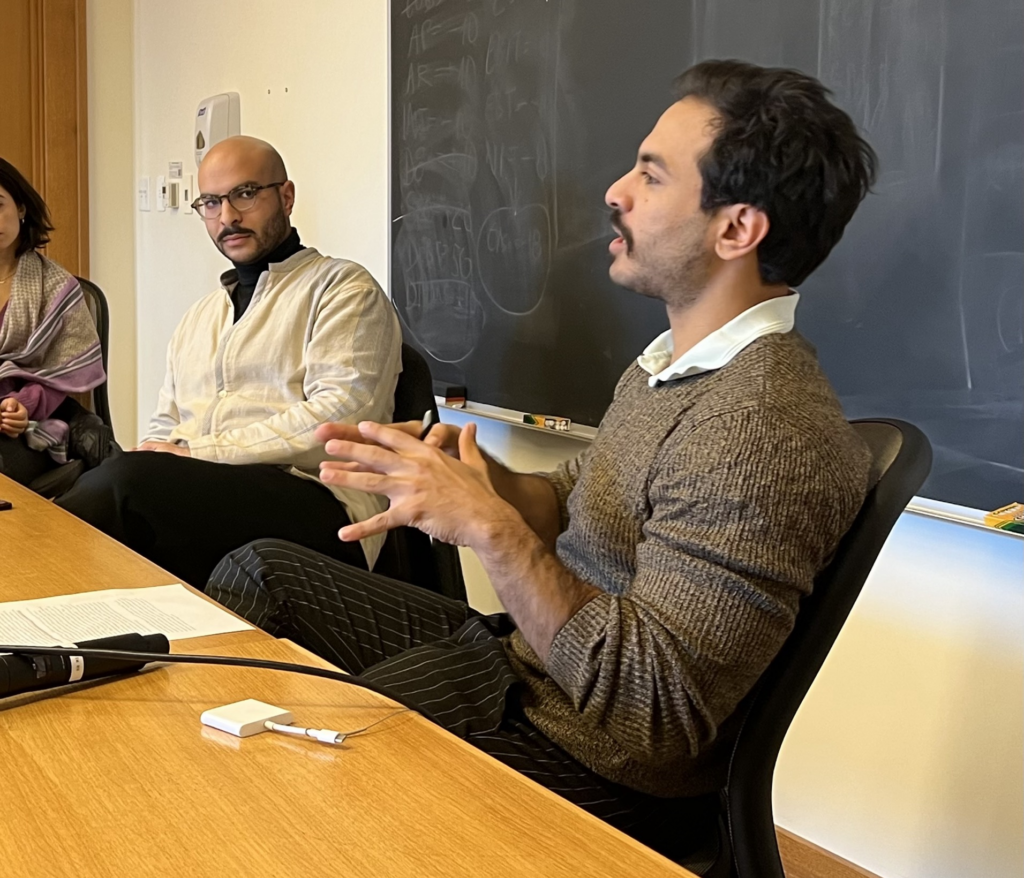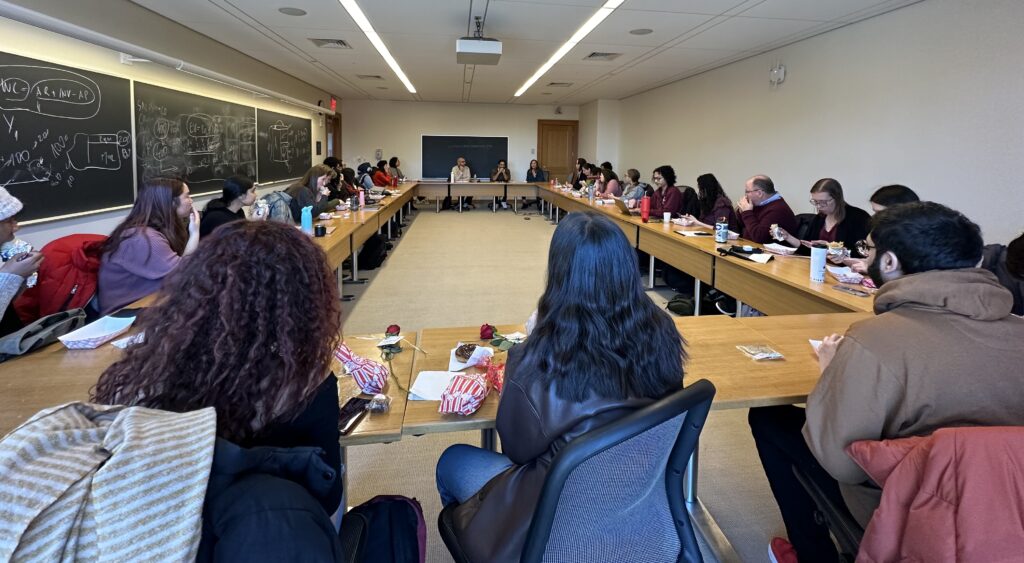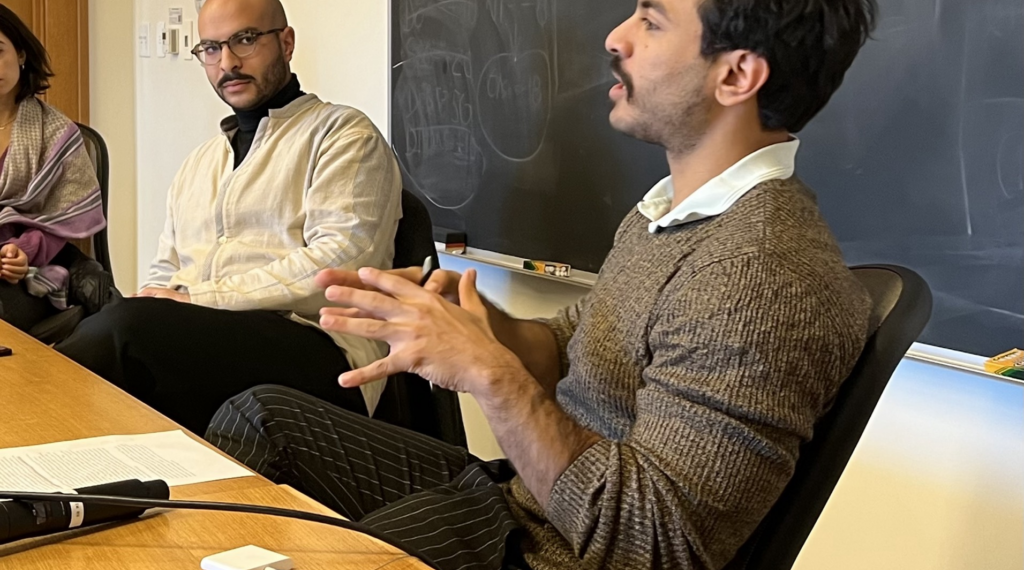[ad_1]
Prospects and Obstacles of Strategic Human Rights Litigation Globally: A Spotlight on Egypt

At a recent discussion hosted by the Program on law and Society in the Muslim World and the Human Rights Program at Harvard Law School, Nader Andrawos, Egyptian legal historian and Residential Fellow at the HLS Institute for Global Law and Policy, dove into the experience of human rights litigation in Egyptian courts, illuminating the discourses that lawyers employ to vindicate human rights within a highly circumscribed and volatile political context.
The conversation, moderated by Omar Abdel-Ghaffar, JD ’25, began by considering the structural characteristics of Egypt’s legal system. From an American perspective, Egypt’s inquisitorial, civil law system presents unique obstacles to human rights litigation. Whereas human rights norms in the U.S. adversarial system develop in courtroom clashes against the state, an inquisitorial system, where judges get involved in investigating the facts, involves the state in producing civil rights. Yet Andrawos notes that Egypt’s system may be more complex than this distinction suggests. Under the Conseil d’État system modelled on French courts, Egypt’s administrative courts provide a platform where the parties and the judiciary contest, question, and negotiate “the boundaries of state-ness and statehood.”
The indeterminacies and contradictions within Egypt’s human rights ecosystem also come to the fore when arguments from international law get involved. Article 93 of the Egyptian Constitution enshrines a commitment to international agreements. But as Andrawos emphasizes, international norms are inflected through a local lens, so they are rarely decisive in adjudicating cases. For Andrawos, efforts to deploy international legal argumentation are useful precisely because the Egyptian system fails to translate them to the local context. Such failures help lawyers by illuminating deficiencies within the system.
Such a system emanates from Egypt’s constitutional tradition beginning with the country’s 1923 constitution, which Andrawos emphasizes still exerts influence on contemporary discourse, despite not being legally in effect. Although constitutional suspensions and rewritings punctuate Egyptian history, (the most recent form being the 2014 constitution), Egypt nevertheless retains a constitutional “memory” dating back to this early period, a memory that idealizes a liberal democratic constitutional order. Andrawos nonetheless refrains from characterizing the Egyptian experience as “constitutionalism” given the prevalence of illiberal elements such as military courts and emergency laws.
This constitutional memory drives a proceduralist approach to human rights litigation. Though using diverse strategies and toward differing ends, Egyptian human rights lawyers converge upon proceduralist values such as the rule of law. For example, in torture litigation, claims usually address the procedural fidelity of victim testimony or the value of confessions obtained through torture. Such a deep faith in procedure and rule of law may strike some as bizarre given Egypt’s fractured political context, where power often prevails over universal principles.
To Andrawos, such proceduralist invocations can have multiple explanations. Perhaps they are a bid by lawyers to sustain their own relevance and legitimacy. In response to an audience question on how lawyers relate to political movements, Andrawos points to their instinct toward the construction of stable identities and socialization. Although the decision to practice law can embody a lawyer’s individual political commitments (secularism, socialism, Islamism, etc.), when they appear before the state they engage in a shared “vocational performance” by portraying themselves as upholders of a long constitutional tradition. Harkening back to the historical role of lawyers, particularly through organizations such as the Lawyers Syndicate, in crafting this tradition helps legitimize their advocacy before the courts. These proceduralist appeals can also overcome ideological divides—even as leftists and Islamists disagree on substantive outcomes, they may nevertheless agree that an effective process is required to arrive at those outcomes.
Less cynically, perhaps lawyers see the “rule of law” as inherently desirable regardless of political context. Although legal academia would resist the equation of “rule of law” with justice, the phrase nevertheless is a convenient, colloquial shorthand for what non-lawyers grasp as “justice.” Indeed, in the post-revolution context succeeding the Arab Spring, proceduralism has an aspirational dimension, alluding to “a future that is yet to come.”
Yet political realities often frustrate these aspirations. Andrawos notes how, while judges may sympathize with the lawyers’ moral crusade, courts are anxious to preserve their gains and therefore avoid excessive confrontation with the executive branch. One example is how litigation against the Emergency Laws, which suspend civil rights for security purposes and punt disputes to an opaque emergency court system, has failed because judges are cognizant of their precarious position vis-à-vis other branches of the state.
Proceduralism is just one way in which the aversion to substantive norms manifests in human rights litigation. Andrawos refers to a recent case that contested the Egyptian government’s decision to transfer sovereignty over two islands on the Red Sea (Sanafir and Tiran) to Saudi Arabia. While activists mobilized in the streets around a discourse of human rights, the actual litigation boiled down to highly technical language about maps and cartography, despite being spearheaded by a prominent human rights lawyer. Andrawos uses this example to show how even leftist lawyers are drawn to technical legal strategies rather than those that invoke substantive human rights norms—and where substantive norms are discussed in judgments, they usually revolve around top-down conceptions of sovereignty and honor.
The discussion therefore illustrated the highly circumscribed nature of human rights lawyering in Egypt. Given that the boundaries of statehood and judicial authority are undetermined, human rights lawyers deploy proceduralism as a common discourse to sustain their own legitimacy, find common ground, and ultimately seek stability in a fluctuating judicial ecosystem.

Written by Ariq Hatibie, JD ’24.
[ad_2]




